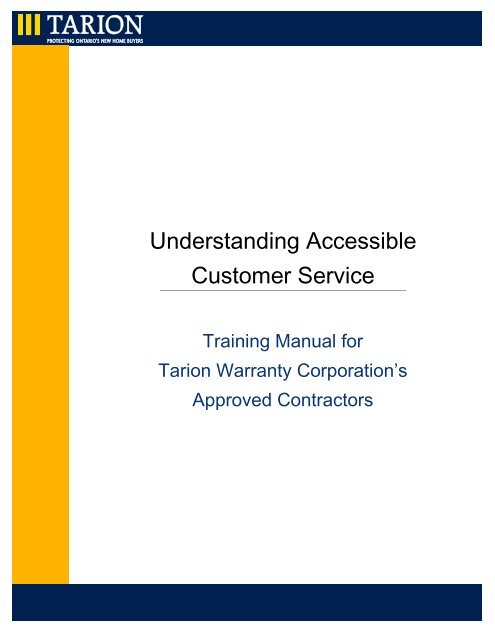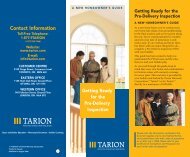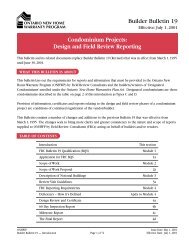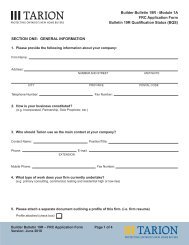Understanding Accessible Customer Service – Training ... - Tarion
Understanding Accessible Customer Service – Training ... - Tarion
Understanding Accessible Customer Service – Training ... - Tarion
Create successful ePaper yourself
Turn your PDF publications into a flip-book with our unique Google optimized e-Paper software.
<strong>Understanding</strong> <strong>Accessible</strong><strong>Customer</strong> <strong>Service</strong><strong>Training</strong> Manual for<strong>Tarion</strong> Warranty Corporation’sApproved Contractors
TABLE OF CONTENTSBACKGROUND .......................................................................................... 3TARION WARRANTY CORPORATION POLICY STATEMENT ................. 3WHAT IS ACCESSIBLE CUSTOMER SERVICE? ...................................... 4DISRUPTION OF SERVICES ..................................................................... 9FEEDBACK .............................................................................................. 10COMPLIANCE FORM FOR TARION APPROVED CONTRACTORS ....... 11Page 2 of 11
BACKGROUNDThe Accessibility for Ontarians with Disabilities Act, 2005 (AODA) was passed by theOntario legislature with the goal of creating standards to improve accessibility acrossthe province. Recognizing the history of discrimination against persons with disabilitiesin Ontario, the purpose of this Act is to benefit all Ontarians.The AODA allows the government to develop specific standards of accessibility that aredesigned to help make Ontario more accessible.One of the specific standards that has been developed, and made law, is the <strong>Accessible</strong><strong>Customer</strong> <strong>Service</strong> Standard. This standard details specific requirements for all serviceproviders.• The customer service standard is simply about:• <strong>Understanding</strong> that customers with disabilities may have different needs, and• Finding the best way to help them access our goods and servicesTARION WARRANTY CORPORATION POLICY STATEMENT<strong>Tarion</strong> is committed to providing quality goods and services that are accessible to allpersons that we serve in a manner that:• Respects the dignity and independence of each individual;• Each individual is integrated as fully as practicable into the method of servicedelivery;• Ensures an equal opportunity for each individual to obtain and use our goods andservices; and• Allows all persons to benefit from the same services, in the same place, and in asimilar way.By considering these principles when developing policies, practices, and procedures,accessibility planning becomes entrenched with the decision making process andsatisfies the spirit with which the AODA, 2005 was enacted.Page 3 of 11
WHAT IS ACCESSIBLE CUSTOMER SERVICE?<strong>Accessible</strong> customer service can mean many things. Mostly, it is the understanding thateach individual may need a slightly different type of accommodation. For example, aperson who is visually impaired may need to have information read aloud to them; anindividual with a learning disability may need to have instructions written down; andsomeone who uses a wheelchair may need help in finding a route they can use.<strong>Accessible</strong> customer service is good customer service <strong>–</strong> courteous, helpful and prompt.Interaction and Communication with <strong>Customer</strong>s who have DisabilitiesAlways start with people first. In language, that means saying “person with a disability”,rather than “a disabled person”. In any interaction, it means addressing the person’saccess and accommodation needs, rather than focusing on the disability.First and foremost, get to know your customer because many disabilities are invisible.By focusing on your customer, you will better understand their needs. Also, don’tassume what the customer can or can’t do.Let’s take some time to understand a few different disabilities and review some tips toassist you in providing accessible customer service.People with Physical DisabilitiesOnly some people with physical disabilities use a wheelchair. Someone with a spinalcord injury may use crutches while someone with severe arthritis or a heart conditionmay have difficulty walking longer distances.Tips:• If you need to have a lengthy conversation with someone who uses a wheelchair orscooter, consider sitting so you can make eye contact at the same level.• Don’t touch items or equipment, such as canes or wheelchairs, without permission.• If you have permission to move a person’s wheelchair, don’t leave them in anawkward, dangerous or undignified position, such as facing a wall or in the path ofopening doors.Page 4 of 11
People with Vision LossVision loss can restrict someone’s ability to read, locate landmarks or see hazards.Some customers may use a guide dog or a white cane, while others may not.Tips:• When you know someone has vision loss, don’t assume the individual can’t see you.Many people who have low vision still have some sight.• Identify yourself when you approach and speak directly to the customer.• Ask if they would like you to read any printed material out loud to them (for example,a menu or schedule of fees).• When providing directions or instructions, be precise and descriptive.• Offer your elbow to guide them if needed.People who have Hearing LossPeople who have hearing loss may be deaf, deafened or hard of hearing. They mayalso be oral deaf <strong>–</strong> unable to hear, but prefer to talk instead of using sign language.These terms are used to describe different levels of hearing and/or the way a person’shearing was diminished or lost.Tips:• Once a customer has identified themselves as having hearing loss, make sure youare in a well-lit area where they can see your face and read your lips.• As needed, attract the customer’s attention before speaking. Try a gentle touch onthe shoulder or wave of your hand.• If your customer uses a hearing aid, reduce background noise or move to a quieterarea.• If necessary, ask if another method of communicating would be easier (for example,using a pen and paper).Page 5 of 11
People who are DeafblindA person who is deafblind may have some degree of both hearing and vision loss. Manypeople who are deafblind will be accompanied by an intervenor, a professional supportperson who helps with communication.Tips:• A customer who is deafblind is likely to explain to you how to communicate withthem, perhaps with an assistance card or a note.• Speak directly to your customer, not to the intervenor.People with Speech or Language ImpairmentsCerebral palsy, hearing loss or other conditions may make it difficult for a person topronounce words or may cause slurring. Some people who have severe difficulties mayuse a communication board or other assistive devices.Tips:• Don’t assume that a person with speech impairment also has another disability.• Whenever possible, ask questions that can be answered with “yes” or a “no”.• Be patient. Don’t interrupt or finish your customer’s sentences.People who have Learning DisabilitiesThe term “learning disabilities” refers to a variety of disorders. One example is dyslexia,which affects how a person takes in or retains information. This disability may becomeapparent when a person has difficulty reading material or understanding the informationyou are providing.Page 6 of 11
Tips:• Be patient <strong>–</strong> people with some learning disabilities may take a little longer to processinformation, to understand and to respond.• Try to provide information in a way that takes into account the customer’s disability.For example, some people with learning disabilities find written words difficult tounderstand, while others may have problems with numbers and math.People who have Intellectual / Developmental DisabilitiesDevelopmental or intellectual disabilities, such as Down Syndrome, can limit a person’sability to learn, communicate, do everyday physical activities and live independently.You may not know that someone has this disability unless you are told.Tips:• Don’t make assumptions about what a person can do.• Use plain language.• Provide one piece of information at a time.People who have Mental Health DisabilitiesMental health issues can affect a person’s ability to think clearly, concentrate orremember things. Mental health disability is a broad term for many disorders that canrange in severity. For example, some customers may experience anxiety due tohallucinations, mood swings, phobias or panic disorder.Tips:• If you sense or know that a customer has a mental health disability be sure to treatthem with the same respect and consideration you have for everyone else.• Be confident, calm and reassuring.• If a customer appears to be in crisis, ask them to tell you the best way to help.Page 7 of 11
As well as learning to interact with customers with disabilities we need to be aware ofand understanding of who or what our customers may need to use to assist them intheir daily lives.One such aid that may assist a person with a disability is a service animal.• A “service animal” is an animal which is specially trained to assist an individualwith disabilities.• An animal is a “service animal” if it is readily apparent that the animal is used bya person with a disability for reasons relating to his or her disability, for example aguide dog wearing a harness.• If it is not readily apparent that the animal is a “service animal”, then a letter froma physician or nurse confirming that the person requires the animal for reasonsrelating to the disability is required.<strong>Tarion</strong> is committed to welcoming people with disabilities who are accompanied by aservice animal on the parts of our premises that are open to the public and other thirdparties. We will also ensure that all staff, volunteers and others dealing with the publicare properly trained in how to interact with people with disabilities who are accompaniedby a service animal. Remember the animal is working, he/she is not a pet and you donot need to interact with him/her nor should you distract the animal from its job. Whenin doubt regarding the role of a service animal simply ask our customer.Another aid may be a support person, which may mean:• In relation to a person with a disability, another person who accompanies him orher in other to help with communication, mobility, personal care or medical needsor with access to goods or services; and• May be a paid professional, a volunteer, a family member or a friend.<strong>Tarion</strong> is committed to welcoming people with disabilities who are accompanied by asupport person. Any person with a disability who is accompanied by a support personwill be allowed to enter <strong>Tarion</strong>’s premises with his or her support person. At no time willa person with a disability who is accompanied by a support person be prevented fromhaving access to his or her support person while on our premises. Remember to speakdirectly to our customer not their support person. When in doubt regarding the role of asupport person simply ask our customer.Page 8 of 11
An assistive device can also be used as an aid and may include the following:• wheelchairs, walkers• white canes used by people who are blind or who have low vision• note taking devices• portable magnifiers• recording machines• assistive listening devices• personal oxygen tanks• devices for grasping• TTY machinesIf a person with a disability requires assistive devices to access <strong>Tarion</strong>’s goods orservices, they are allowed to use such devices. <strong>Tarion</strong> does not however provide suchdevices. Staff must be aware of such devices and the necessity of our customer’s useof them. When in doubt regarding an assistive device simply ask our customer.DISRUPTION OF SERVICESSometimes events may occur that do not allow <strong>Tarion</strong> to provide a particular service fora short period time.If there is a temporary disruption in a particular facility or service used to allow a personwith a disability to access goods or services, <strong>Tarion</strong> will give notice of the disruption byposting the reason for the disruption, the anticipated duration of the disruption, andalternative facilities or services that may be available. This posting will be in aconspicuous place on <strong>Tarion</strong> premises, or by other reasonable methods in thecircumstances. If the disruption is anticipated, <strong>Tarion</strong> will provide a reasonable amountof advance notice of the disruption. If the disruption is unexpected, notice will beprovided as soon as possible.Page 9 of 11
FEEDBACK<strong>Tarion</strong> has mechanisms in place for our customers to provide feedback on how we’redoing meeting the AODA customer service standards. <strong>Customer</strong>s can also use thisprocess to let us know if they are having difficulties accessing our services.The public can provide feedback on the accessibility of the provision of goods andservices by <strong>Tarion</strong> in the following ways:In person or via mail: By Fax: By E-mail:<strong>Tarion</strong> Warranty Corporation 1-877-664-9710 info@tarion.com5160 Yonge Street, 12 th FloorToronto, ON M2N 6L9<strong>Tarion</strong> will respond to feedback within 5 - 7 business days of its receipt.People with disabilities are generally aware they may need some accommodations andwill work with you. Just remember to ask how you can help.It is important to recognize that there are internal and external resources available foryou to use to assist you in delivering service to persons with disabilities:• Review the Government of Ontario Website: http://www.accesson.ca• Review the Website: http://www.tarion.com• The Bell Relay <strong>Service</strong> Operator is available to assist in placing orreceiving calls to/from persons who use a TTY. There is no charge forlocal calls. To place a call through the BCRS (Bell Canada Relay <strong>Service</strong>),call: 1-800-855-0511. The Bell Relay Operator will ask if you have usedthis service in the past. If you have not, they will provide you with simpleinstructions on how to use the service.• Book a Sign Language Interpreter* through the Ontario Interpreting<strong>Service</strong>s at the Canadian Hearing Society at: 1-888-363-0373• Contact: Director, <strong>Customer</strong> <strong>Service</strong>s at 416-229-3804,1-877-982-7466 ext. 3804 or info@tarion.comPage 10 of 11
Accessibility for Ontarians with Disabilities Act, 2005Ontario Regulation 429/07COMPLIANCE FORM FOR TARION APPROVED CONTRACTORSContracting Party: _____________________________________________________Address: _____________________________________________________________E-mail address: _______________________________________________________Telephone number: ____________________________________________________I, ____________________________ have the authority to bind the contracting party(please print name)and I verify that our company meets the requirements of the Accessibility for <strong>Customer</strong><strong>Service</strong> Regulation 429/07, Section 6; <strong>Training</strong> For Staff and will continue to meet theserequirements for the duration of the contract or services being provided to <strong>Tarion</strong>Warranty Corporation.Signature: ___________________________________________________________Title: ________________________________________________________________Date: ________________________________________________________________Please submit to the <strong>Tarion</strong> Warranty Corporation, Claims Department prior to thebeginning of any contract work for <strong>Tarion</strong> Warranty Corporation.<strong>Tarion</strong> Warranty CorporationClaims Department5160 Yonge Street, 12 th FloorToronto, ON M2N 6LPage 11 of 11










